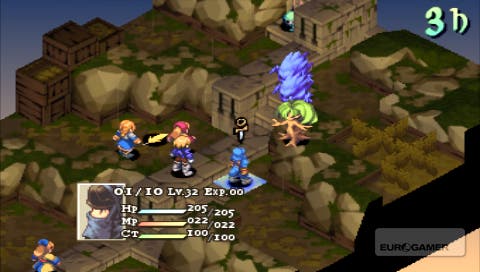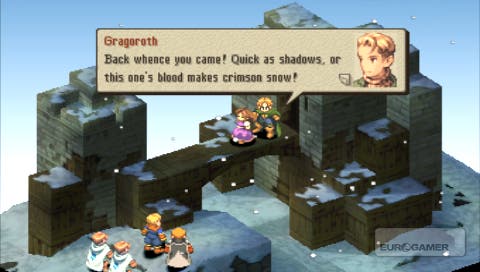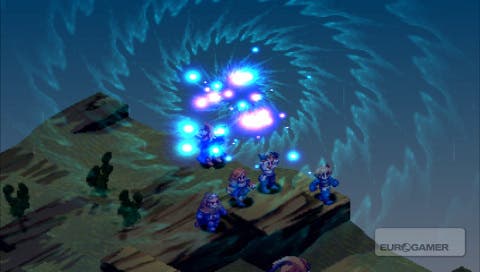Final Fantasy Tactics: The War of the Lions
When two prides go to war - uh!
Wearing my JRPG Nerd Hat (yes, I own a JRPG Nerd Hat - I wove it myself from the hair of the denizens of Eurogamers' JRPG Otaku group, in fact), I'd probably pick out three games as being the Holy Trinity of titles which have been, thus far, denied to us miserable Europeans.
I'd choose Chrono Cross, stunning follow-up to the SNES classic Chrono Trigger. I'd choose the oddly paced but nonetheless magnificant Xenogears. Last, and certainly not least of the three, I would choose Final Fantasy Tactics - arguably the finest spin-off game to a major franchise the industry has ever produced.
Yes, sorry - I don't really feel like I can keep you in suspense over this one, posing the "ah ha, but is Final Fantasy Tactics really any good?" question and dragging it out for the next thousand words. Final Fantasy Tactics was superb ten years ago on the PlayStation, and it's still superb today in its long-awaited PSP remake. No illusions, from the outset; this is a review of a superb game.
The Noise Before Defeat

This superb game is, at its most basic level, a turn based strategy game. You control a band of soldiers, at the beginning of each battle you choose your force from within this band (normally a fairly small group - four to six is typical). You then move your fighters around a rectangular playing area laid out on a grid, complete with hills, valleys, buildings, rivers and so on. Each character - yours and the enemy's - takes a turn which can include both moving and an action, be it attacking, casting a spell or using an item.
That's the 30 second guide to Final Fantasy Tactics. The full version would probably fill a manuscript so thick it would make Tolkien's eyes water. Certainly, FFT's battles take place on the small scale - they are mere skirmishes between a dozen characters, really. However, the sheer level of depth which the game affords to players who engage with its prodigious charms is sufficient that you have to wonder if there are entire new lifeforms living in the trenches at the bottom.
The character progression system is at the heart of this. At the start of the game, you command a party largely made up of Squires, the basic class who can do a bit of fighting and use some somewhat useful abilities, but who aren't really masters of anything. As each of your soldiers progresses, however, you'll find that you can move them around to new jobs which open up. So a Squire can become a Knight after a few levels, say, or perhaps an Archer, while a Chemist (a basic item-using class who can chuck around potions) could decide to focus on magic and become a White Mage, replacing his potions with healing spells.

Progression between classes isn't the same as levelling up. Instead, the game gives each character an innate level, and a "job level" for each of the jobs available to them. You could, for example, have a character who was level 7, but a Level 3 White Mage, Level 5 Squire and Level 2 Knight. This aspect isn't particularly complex, although it's worth bearing in mind that sometimes the next job along the tree isn't actually better than the one you're doing at the moment - just different.
As you advance in each job class, you'll earn JP - job points - alongside the standard experience points that raise your character level. These points are allocated every time the character performs an action, and are assigned to the job class that action belongs to - and they can be spent on "buying" new abilities within that class, like new spells for the Black Mage or the ability to use more advanced items for the Chemist. To mix things up a little, each character is also capable of expressing job traits from multiple classes.
You may not be interested in strategy...

This is where things start getting complicated (yes, start!) - and although it's initially somewhat daunting (and the game is pretty awful at holding your hand through early experiments with job classes and abilities), it's also where much of the depth of the game comes through.
So, to pick up another example, you might have a character who has levelled up to some degree both as a Chemist and a White Mage, but is presently set as a Chemist. His first action slot will always be the actions open to him as a Chemist (using items, mostly) and his innate talents will be that of a Chemist. In a second action slot, you could add White Mage abilities, giving him the power to cast healing or protective spells. Even more complexity comes from the ability to add other abilities from the full range of job classes you've picked up - the same character could have the Counter-Tackle ability from the Squire, for example, which counter-attacks automatically in response to physical damage.
If your eyes have glazed over at this point as though you're at a really, really dull lecture, then this may not be the game for you. On the other hand, if you're turning over in your mind the prospects afforded by a game in which each character can be customised with abilities from a wide range of job classes... Well, come on in and let me buy you a beer. We have much to discuss.


